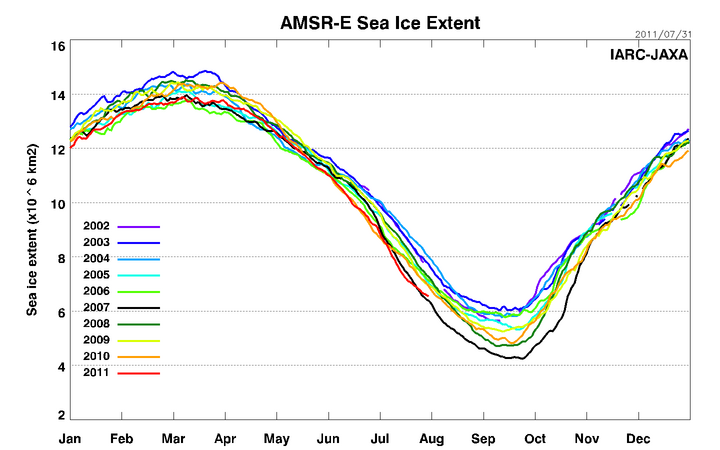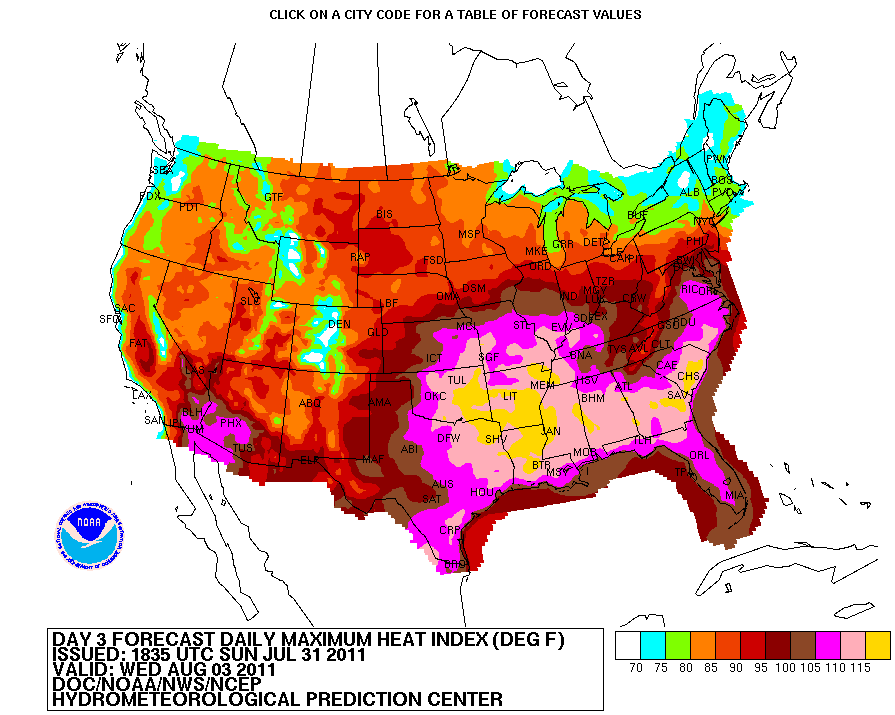1 August 2011
Weekend Digest- Tropical Trouble, Melting Ice and Mainstream Scientists Speak Out
Posted by Dan Satterfield
This is the weekly digest of Earth science news that I said would be posted every Friday. OK, so it’s a bit late but it is still the weekend and what follows is a summary of interesting tidbits I’ve seen this week on other science blogs etc. We begin with the great 2011 drought/heat wave:
Deep Fried Texans
Austin, Texas is happy to wave so long to July. It was the hottest in the 157 year period of record, and the numerical weather prediction guidance shows no relief in sight. If anything, I think it will get hotter still this week with heat indexes reaching very high levels across much of the Southern Plains into the Southeast. Almost half of Texas is now classified as being in exceptional drought. Nearly 65% is either exceptional or severe and Oklahoma is not much better.
The southeast has actually not had it as bad for much of the summer, with the heat index values not going much above 100, but this next week will likely bring values above 112 in much of TN,AL and Georgia. This heat wave has actually been noted for its extreme high humidity, and I can never recall seeing an 80 degree (27C) dew point in North Dakota until this year.
Hello Emily
 A new tropical system is brewing just East of the Windward islands. The NHC sent a recon plane out to look at it, but they found no closed circulation. This system looks quite healthy on satellite images and water temps/low wind shear are all favourable for slow development. Long range guidance is indicating that this system may approach the Bahamas in about 5 days. It will be named Emily when winds reach tropical storm force at 35 knots (65 kph). My forecaster instinct tells me this is NOT a Gulf storm.
A new tropical system is brewing just East of the Windward islands. The NHC sent a recon plane out to look at it, but they found no closed circulation. This system looks quite healthy on satellite images and water temps/low wind shear are all favourable for slow development. Long range guidance is indicating that this system may approach the Bahamas in about 5 days. It will be named Emily when winds reach tropical storm force at 35 knots (65 kph). My forecaster instinct tells me this is NOT a Gulf storm.
Why Your Uncle In Siberia Has Such Large Lovely Eyes
A group of scientists published research showing that humans who live in higher latitudes have evolved larger eyes and brains to match. The reason seems to be that the larger brain is needed to process the darker images the larger eyes see. Winter daylight is much lower in northern latitudes and this makes sense. I’m kind of surprised no one had thought of doing this before. The BBC has an excellent story on it.
Intense Criticism of Peer Review Process at Obscure Journal
The science community has been extremely critical of the peer review process at the open access journal Remote Sensing which published a paper by a noted climate skeptic this week. The paper itself has been criticised heavily (that’s putting it rather mildly) by many of the top atmospheric scientists with Kevin Trenberth (NCAR) saying the paper had no merit, and that he couldn’t believe it was published.
 Phil Plait at Bad Astronomy also posted about it as did Joe Romm. The BBC, who last week announced, that they would no longer give a platform to these silly claims from climate deniers has so far ignored it. Journalism is about giving all sides to a story but there are limits. Responsible main stream journalists do not give equal time to those who thinks the moon landing was a hoax in every story on the Apollo program!
Phil Plait at Bad Astronomy also posted about it as did Joe Romm. The BBC, who last week announced, that they would no longer give a platform to these silly claims from climate deniers has so far ignored it. Journalism is about giving all sides to a story but there are limits. Responsible main stream journalists do not give equal time to those who thinks the moon landing was a hoax in every story on the Apollo program!
Vaccines Save Lives
Phil Plait also has good news about the anti-vax folks. Jenny McCarthy will not get a platform on the Oprah network to talk people into not vaccinating their kids. The winner here will be the kids who do not get sick or die from diseases that are perfectly preventable. It surprises me how many people still don’t know that the Doctor who claimed there was a link between the MMR jab and autism is no longer allowed to practice- he was, as the Brits say, “struck off” the register .
Apples Bank Account
Apple apparently has more money in the bank tonight than the U.S. government. Well, they do provide a better service and a better product…. 😉
Kiwi Landslides
My fellow AGU blogger Dave Petley is down under in New Zealand and has a cool post on the road over Arthur’s pass in the Southern Alps. Trust me, It’s one of the most amazing drives you will ever take. How they protected the road from landslides is the subject of his post.
The Big Melt
Arctic sea ice has been melting very quickly all summer and the possibilities of a new record low in aerial extent remain. Over the past week the melt has slowed somewhat but it will still be a very close call. I vote for 4th place this year.




 Dan Satterfield has worked as an on air meteorologist for 32 years in Oklahoma, Florida and Alabama. Forecasting weather is Dan's job, but all of Earth Science is his passion. This journal is where Dan writes about things he has too little time for on air. Dan blogs about peer-reviewed Earth science for Junior High level audiences and up.
Dan Satterfield has worked as an on air meteorologist for 32 years in Oklahoma, Florida and Alabama. Forecasting weather is Dan's job, but all of Earth Science is his passion. This journal is where Dan writes about things he has too little time for on air. Dan blogs about peer-reviewed Earth science for Junior High level audiences and up.
Thanks for sharing the plight of the Texas drought. I am one of those “Deep Fried” Texans….living down here in Midland, Texas where even the cactus are becoming pretty scrawny. It is 103F outside as I write this and we have only had 0.13 inches of rainfall in the past seven months. The lakes are dried up…they are rationing water, my lawn in dying and I am sitting here trying to write a paper I’m presenting at the annual GSA meeting this fall titled…. “GLACIAL GEOLOGIC FRAMEWORK OF THE WOLF POINT QUADRANGLE, NORTHEASTERN MONTANA, BASED on HYDROGEOLOGIC AND GEOPHYSICAL STUDIES”…..It is difficult to focus on glacial geology when the immediate world around me is burining up.
Oh, well…the coyote is scratching to come in….I better let him in.